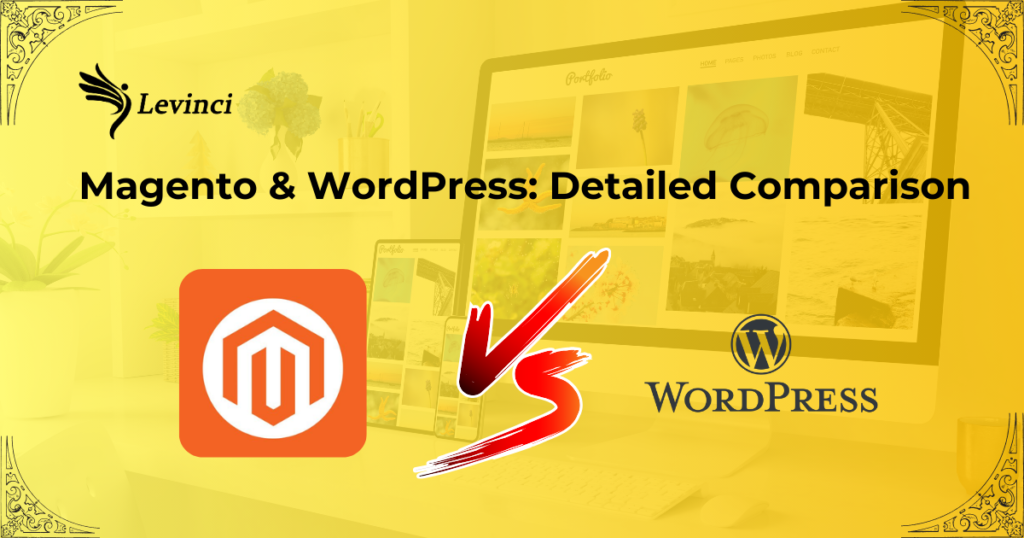Magento and WordPress are two popular website development platforms with many different features and options. If you are wondering which platform is suitable for developing your project, read the Magento and WordPress comparison article below!
Definition of Magento

Magento is essentially a software platform designed specifically to create fully customizable and scalable online stores. It’s like having a digital marketplace builder, owned by Adobe, that comes in two flavors depending on your needs:
- Magento Open Source (formerly Magento Community Edition): This is a free, open-source version that gives you a lot of flexibility to customize your store. It’s a good option for businesses that are comfortable with development work or have a developer on staff.
- Adobe Commerce (formerly Magento Enterprise Edition): This is a paid, hosted version of Magento that offers more features and support than the open-source version. It’s a good option for larger businesses that need a more robust and scalable ecommerce platform.
Magento was born on March 31, 2008, and is considered one of the most popular e-commerce platforms many years later. In particular, Magento is especially trusted by world-famous brands such as Samsung, Nike, Lenovo, Ford,…
Definition of WordPress

WordPress is created by open source code, written in PHP language and has a huge content management system. Launched about five years earlier than Magento, WordPress also offers an easy-to-use plug-in architecture for embedding and customizing themes. WordPress is often used to build blogs, create forums, etc. For e-commerce features, WordPress is not pre-installed but needs to be adapted through a third-party module, which is WooCommerce.
The difference between Magento & WordPress
This detailed comparison dives into the functionalities, complexities, and ideal uses of each platform, empowering you to choose the perfect foundation for your online empire.
User friendliness
WordPress has a more user-friendly than Magento. WordPress offers an intuitive dashboard that makes it easy for anyone to set up an online store, install a theme, add a blog, or manage pages on your website.
Magento’s UI/UX often causes many difficulties during deployment and requires the help of a developer. Furthermore, Magento needs a plugin to have blogging functionality similar to WordPress.
Ecommerce

Magento will be an ideal choice in building and operating an online store if used on a built-in e-commerce platform. Because Magento is integrated with useful functions such as: product level, multiple store management, discounts and product comparison. Therefore, Magento will be an ideal platform for small businesses that are growing rapidly.
On the other hand, WordPress is not a platform solely for e-commerce. Therefore, to open a store on WordPress, you need to use an e-commerce plugin to create the store. Among them, the WooCommerce plugin is the most commonly used today. However, setting up WooCommerce is relatively simple and does not require too much experience.
There are many different plugins and functionalities added to WordPress. This gives WordPress an advantage over Magento – a platform built specifically for e-commerce.
Themes and templates
Both Magento and WordPress provide large libraries of themes and templates with powerful design and customization capabilities, from ready-to-go no-code themes to custom themes. The difference is that Magento provides more powerful features, suitable for enterprise-class online stores. However, to use these themes, you need to pay the corresponding fee. Some themes cost up to $10,000.
Security

Magento offers more robust built-in security features, especially in the paid version (Adobe Commerce). However, its complexity makes it more vulnerable if not managed properly. WordPress is generally considered easier to secure, but it relies heavily on user vigilance to keep plugins and themes updated and avoid insecure options.
Search Engine Optimization
Both Magento and WordPress can be optimized for SEO, but WordPress might be easier for beginners due to its existing SEO focus and plugin availability. On the other hand, Magento offers strong SEO capabilities, but requires more technical expertise to unlock its full potential.
Blogging

WordPress began as a blogging platform and remains a favorite among bloggers today. Features specifically designed for managing blog content make it easy to share your thoughts with the world. On the other hand, Magento lacks blog support features. While online stores don’t need a blog to be successful, providing regular content on a blog can help you feed your newsletters, build brand awareness, and attract organic traffic through SEO.
Price
In terms of cost, WordPress has a lower price than Magento. Magento’s powerful built-in e-commerce features come at a premium, so even if you’re relying on an open source installation, you’ll still need to pay if you want to build your own unique store. More advanced themes cost up to $10,000 and to build and operate a basic Magento store can cost $15,000.
Should you choose Magento or WordPress for your business?

Choosing between Magento and WordPress for your business depends on several factors, mainly the type of business you have and your technical comfort level. If you are a medium to large business interested in creating an online store, Magento has the edge.
On the other hand, if marketing your products and services relies heavily on content marketing, then WordPress with its fully featured e-commerce plugins like WooCommerce is a more suitable solution. Both platforms have many extensions and add-ons to overcome their weaknesses.
If you’re still unsure, consider consulting with a web development company who can assess your business goals and recommend the most suitable solution.
Conclusion
Levinci has compiled content comparing Magento and WordPress, hoping to help you choose a platform that suits your website building needs. Don’t forget to follow Levinci to see many other useful articles. If you are looking for a Magento implementation unit, contact Levinci now!

